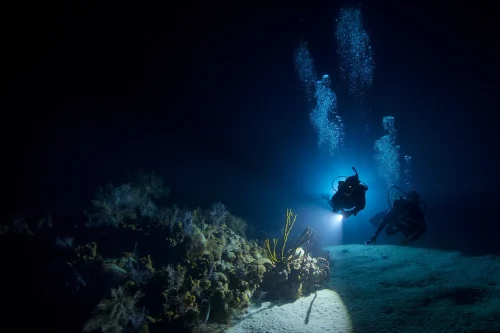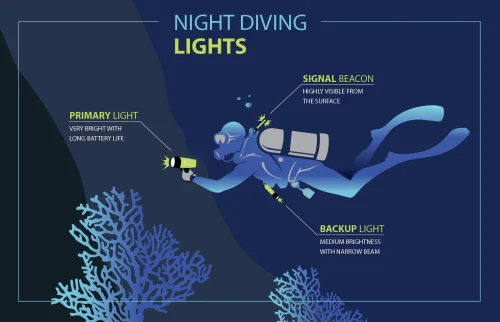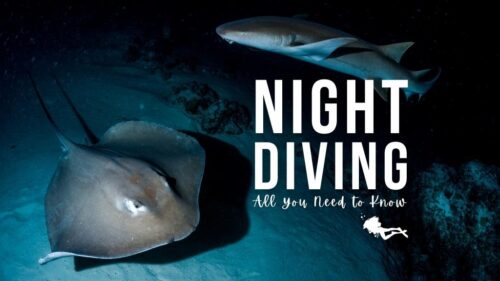Night Dive: Discovering the Ocean’s Secrets & A Safety Guide by PADI Standards
When the sun sets and darkness envelops the sea, a whole new world, full of mystery and charm, awakens beneath the waves. A Night Dive is not just a sport; it’s a gateway to another dimension of the ocean, where daytime creatures hide, making way for the “denizens of the dark” to take over.

1. What is a Night Dive? A Completely Different Experience
Essentially, a night dive is a scuba dive conducted after sunset. However, this definition fails to capture the full difference and magic it holds compared to diving during the day.
A shift in senses: Your vision is no longer a wide panoramic picture but is narrowed down to a single beam of light from your dive torch. This forces you to focus completely, paying attention to the smallest details that might be easily overlooked during the day. This feeling is described by many as “surreal” and almost meditative, as the only sound remaining is your own steady breathing.
An inverted world of creatures: Many marine species are nocturnal. Nighttime is when they leave their shelters to hunt. You’ll have the chance to witness rare sights: a graceful octopus on the hunt, schools of squid darting through the night, or lobsters and crabs emerging from their rocky homes.
“Blooming” corals: Many hard corals, which remain closed during the day, will extend their polyps (the soft body parts) to catch plankton. This spectacle looks like an entire garden blooming at the bottom of the sea.
Bioluminescence: One of the most magical sights is when you briefly turn off your light and gently wave your hand in the water. Thousands of tiny plankton will emit a sparkling light, turning the ocean’s darkness into a mystical starry sky. A classic example is the firefly squid, which can emit a mysterious blue light.
2. Who is Allowed to Night Dive? Mandatory Standards from PADI
Night diving offers wonderful experiences but also comes with potential risks. Therefore, adhering to certification requirements is mandatory and non-negotiable to ensure absolute safety.
Minimum Requirements
To participate in a night dive, you must meet the following prerequisites:
Foundational Certification: You must hold a PADI Open Water Diver certification (or an equivalent certification from another recognized organization like SSI). This proves that you have mastered basic diving skills and underwater safety procedures.
Age: According to PADI standards, the minimum age to participate in a specialized night diving course is 12 years old.
Specialty Certification: The Golden Key to Confidence
While an Open Water Diver certification is a necessary condition, PADI and experts always encourage divers to complete the PADI Night Diver Specialty course or Advance Open Water Course before truly exploring the ocean at night. This is the sufficient condition for you to dive with the utmost confidence and safety.
This course will equip you with in-depth knowledge and skills not covered in the basic course, including:
Handling and communication techniques using a dive light.
Entry/exit procedures and navigation in the dark.
Controlling buoyancy by feel rather than by sight.
Recognizing changes in the behavior of marine life at night.
Completing this course not only makes you safer but also makes your night diving experience much richer and more enjoyable.
3. What to Prepare for a Night Dive? Essential “Toolkit”
Proper and well-functioning equipment is vital for a safe night dive. Besides basic scuba gear, these are the items you must have.

Most Important Equipment
Primary Dive Light: This is the most crucial item. Choose a dive-specific light with high brightness, a strong beam, and a battery life long enough for the entire dive.
Backup Dive Light: Carrying at least one backup light is mandatory. This is a life-saving device in case your primary light fails.
Other Support Equipment
Dive Computer: Extremely necessary for accurately tracking depth, dive time, and no-decompression limits in low-visibility conditions.
Compass: When familiar landmarks disappear in the darkness, a compass becomes an indispensable tool to prevent disorientation.
Protective Gear: The water can be colder at night, so a suitable wetsuit is important to stay warm. Gloves can help protect your hands from accidental bumps.
Dive Knife or Cutting Tool: A necessary safety tool in case of entanglement in old nets or fishing lines.
>>> Read More: Night Dive in Con Dao island
4. Safe Night Diving: 7 Golden Rules to Memorize
Safety is the number one priority. Even if you are an experienced diver, always strictly follow these golden rules, derived from PADI standards.

- Always Dive with a Buddy (Buddy System): Never dive alone. Stay close, maintain regular contact, and monitor your dive buddy. This is the most basic and important safety rule.
- Follow the Guide: The Divemaster/Instructor is experienced, knows the terrain, and is trained to handle situations. Always listen to and follow all their instructions.
- Thoroughly Check Equipment: Before each dive, perform a comprehensive safety check on both your and your buddy’s equipment, especially lights and tank air.
- Dive Slow, Stay Calm: Move slowly and control your buoyancy well. This not only helps conserve air but also avoids disturbing the environment. Staying calm is the key to handling any unexpected situation.
- Respect the Marine Environment: Absolutely do not touch corals or any marine creatures. This action not only protects them but also protects you from venomous species.
- Familiarize Yourself with the Dive Site: If possible, dive at the same location during the day first. This helps you get acquainted with the terrain and feel more confident when diving at night.
- No-Fly Rule: A crucial safety rule is not to fly or travel to high-altitude areas for 12-18 hours after your last dive to prevent decompression sickness.
Conclusion: Ready to Descend into the Ocean’s Darkness?
A night dive is an adventure into another world, an experience that every diver should try at least once. However, the door to that magical world only opens for those who are well-trained and responsible.
The core message we want to emphasize is: Safety comes from preparation and knowledge. Ensure you have the necessary certifications, ideally the PADI Night Diver Specialty course. Be fully equipped, follow all the rules, and always respect the ocean.
The night ocean awaits with countless mysteries. Start your journey the right way and safely. The call of the deep, dark night is sounding. Are you ready to answer?
>> Read More: Booking Night Dive Trips
> Booking: Scuba Diving Tour
